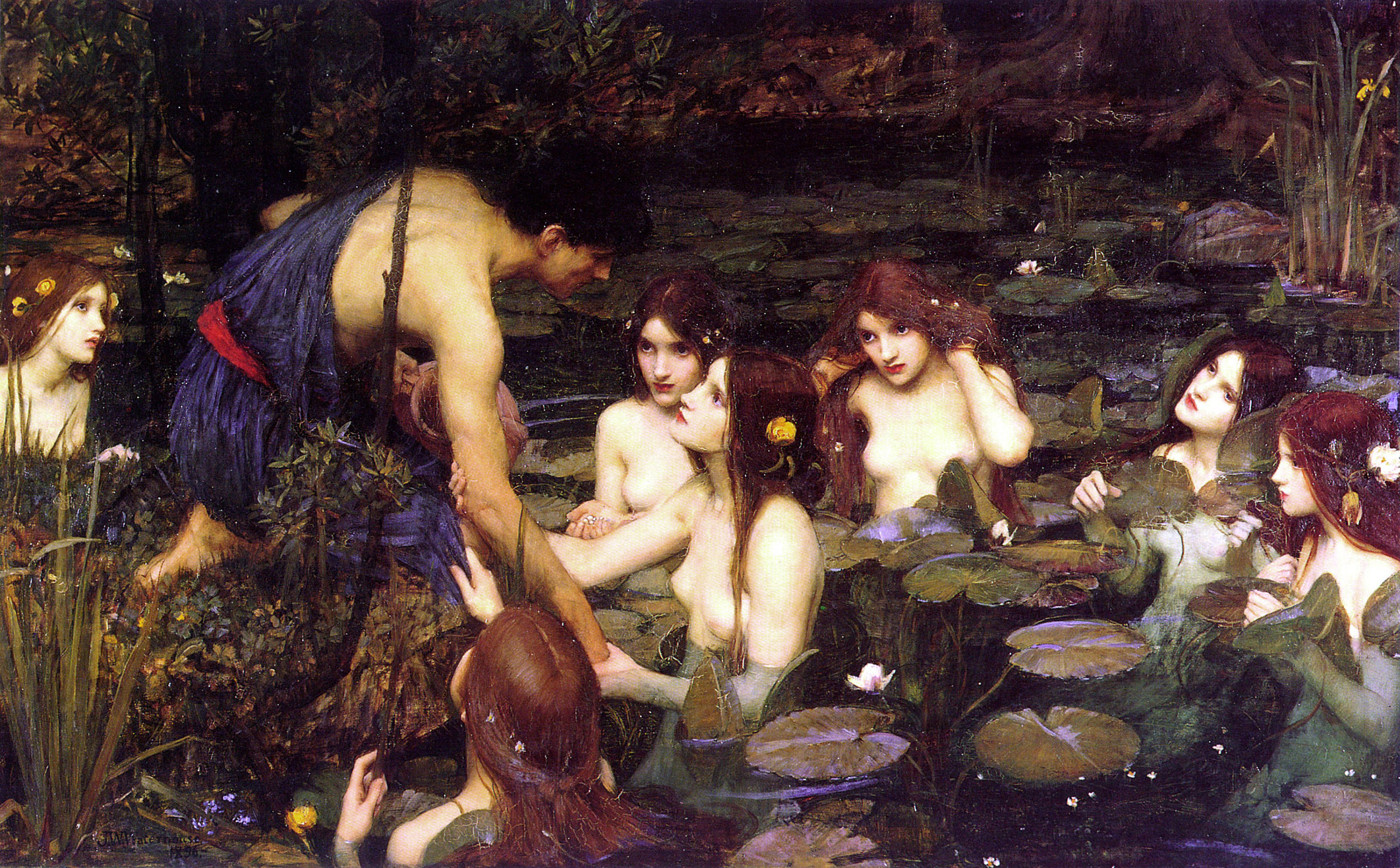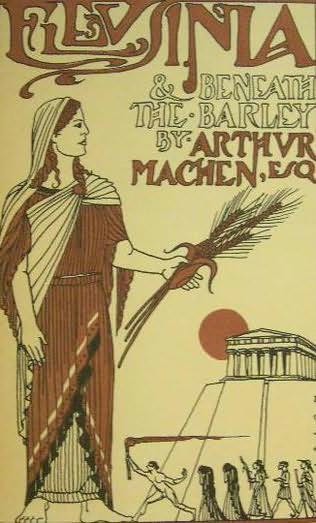EXT. MALTA, BEACH – DAY
VALERIA sits on the rocky beach, toes dangling in the cool water as the sun glistens off the wave-tops and red and green weeds waft greeting as the tide washes over them. An occasional fish-tail sends white spray off the sea just beyond the nearest rocks.
A SEA-NYMPH sits in a larger rock pool, quizzically watching the editor for a few minutes, before finally speaking.
Behind her on the beach, the MINOTAUR sits a bit further up the rocks, hot, flustered and awkwardly huddled, trying to keep his brown-furred feet out of the waves. He looks up at this.
Perched on a sturdy but almost desiccated palm tree overlooking the waterfront, a vicious HARPY chitters to herself, glaring at the editor and monsters on the beach.
As they speak, a long strip of green vegetation just beyond the edge of the water starts to become more exposed, and soon a salt-water CROCODILE crests the surface and grins toothily up at her.
ZOOM TO - ECU OF GRINNING CROCODILE MOUTH. FADES.
VALERIA sits on the rocky beach, toes dangling in the cool water as the sun glistens off the wave-tops and red and green weeds waft greeting as the tide washes over them. An occasional fish-tail sends white spray off the sea just beyond the nearest rocks.
A SEA-NYMPH sits in a larger rock pool, quizzically watching the editor for a few minutes, before finally speaking.
SEA-NYMPH
I asked you why you wanted to publish an anthology about the Mediterranean, and you didn’t want to answer. Why not?
VALERIA
(sighs)
Because I’ve been asked so many times that the temptation to start making up bizarre stories becomes more and more urgent!
SEA-NYMPH
But don’t you realize this is always going to be the first question people want to ask you, and the conversation is going to spin out from there?
VALERIA
I know, it’s a very good starting point… Can I say just because I love it? I love the Mediterranean and its stories. I like its monsters, and I wanted a whole anthology about them! But I’m afraid that would sound unprofessional…
Behind her on the beach, the MINOTAUR sits a bit further up the rocks, hot, flustered and awkwardly huddled, trying to keep his brown-furred feet out of the waves. He looks up at this.
MINOTAUR
Nothing wrong with monsters.
(beat)
Anyway, not all the stories contain monsters. What are some of the other themes in the anthology, and how are they particular to the Mediterranean?
VALERIA
I meant monsters as wonders, as things out of the ordinary. And many things are out of the ordinary in these stories! But, yes, you’re right. It’s not all about fantastic creatures. It was about trying to capture a little bit of the essence of this place. Its history of connected peoples, the mixed languages, the songs and stories travelling on the ships to keep company to the sailors. But also its present as a place of war, waste, exploitation. Those are different kind of monsters too.
MINOTAUR
I try to get away from all that horror myself. How does writing stories about it help anyone?
VALERIA
I’m not entirely sure it would actually help, reality is not exactly my forte. But when I see the place I love tormented and violated I feel angry. When I see my home misrepresented by someone that has just spent a few weeks of holiday there I feel angry. Maybe I thought that more honest (and not for this less beautiful) stories about the darker and more problematic side of the Mediterranean would lessen my anger. And that of others like me. That awareness is always empowering. Silence, indifference is what is killing us.
Perched on a sturdy but almost desiccated palm tree overlooking the waterfront, a vicious HARPY chitters to herself, glaring at the editor and monsters on the beach.
HARPY
Anger is good.
(smiles coldly)
There’s more poetry in this anthology than in most things TFF has published. Is there a reason for this? Is poetry better at capturing that sort of emotion, at shamelessly screeching to the wind, at being noticed?
VALERIA
I’ve always been a story person more than a poetry one. But the authors of this anthology have reminded me how intense poetry can be. How the verses stay with you, stick to your memory and conscience when you roll them in your mouth almost to feel their taste, to discover how they sound. How every word is precious and can become a stone: a gem or a weapon.
HARPY
Weapons are good.
As they speak, a long strip of green vegetation just beyond the edge of the water starts to become more exposed, and soon a salt-water CROCODILE crests the surface and grins toothily up at her.
CROCODILE
Is there anything you regret about the way this anthology has turned out?
VALERIA
I really love it the way it is. I know, I’m biased. But I mean it. I only wish we had more time and strategies to reach more communities of authors. Fae Visions is multifaceted, complex, bizarre. And still is not as rich as we would have wanted it to be. I was really hoping for a short story in Arabic or Turkish or Albanian. I was looking forward to discovering new folk tales and legends from Palestine or Israel. I wanted even more languages, more alphabets. More diverse takes on the fluid mess that is the Mediterranean. Maybe we were too ambitious. But ask me again in some months… I might have something more to say about it.
HARPY
(butting in)
Could you imagine an anthology with no stories originally in English at all?
VALERIA
That sounds like an awesome idea! Especially if this choice was consistent with the theme of the anthology itself. If it were, somehow, part of it. The same way that multilingualism was for us a choice to represent the mosaic of cultures of the Mediterranean. It would be challenging. And would probably need some extra effort from readers. But I think I’d be curious and delighted to see something like that on the shelves of a bookshop.
HARPY
Can you imagine that mosaic a little bit more vividly for us, please? What might it look like?
VALERIA
Well, if I were the editor of such an anthology, I think, in the first place, I would involve entirely authors who have, for one reason or another, a special relationship with language. They might be polyglot because they fell in love with other languages, or because they had to leave their own countries. They might work as modern translators, or have spent time deciphering dead idioms. And I would leave them the freedom to present the work in the way they believe is most adequate. I imagine that some will want to translate their text on the opposing page. Others might want to mix languages in the dialogue and decide that they don’t need to be translated: the readers will deal with foreign words in the same way they would do in real life. There will be footnotes to explain, maybe, or glosses to help the most adventurous to explore unknown linguistic territories. There might be poetry that, when translated, is always a completely different thing. There might even be exercises of style, when the same text looks very different in alternative translations. All correct, but discordant in spirit.
(pauses for breath)
I see it as an hymn to the beauty of languages, and their diversity. A joyous awareness of how words shape our worlds, and the way we inhabit them.
CROCODILE
Who is the best villain in the anthology?
VALERIA
Folktales tend to be a bit unfair towards monsters and non-human creatures, I’m afraid. But I’m happy to say that in our stories fantastic creatures just have… let’s say… a different perspective. Not that they are less dangerous or vengeful. But the reader can sympathize, I think.
Maybe there is only one really evil character. And he’s entirely human. But he gets what he deserves…
Maybe there is only one really evil character. And he’s entirely human. But he gets what he deserves…
(smiles, cracking knuckles with a certain satisfaction)
CROCODILE
(excitedly)
Do you have any guacamole?
VALERIA
No, but I can go back to the AirBnB and make you some in a bit, if you like?
CROCODILE
(crooning with anticipated ecstasy)
You totally rock!
ZOOM TO - ECU OF GRINNING CROCODILE MOUTH. FADES.
Valeria Vitale is the editor of Fae Visions of the Mediterranean, an anthology of horrors and wonders of the sea, from Futurefire.net Publishing and available at all major online booksellers. The monsters also helped with the book, and most of them live in it.

























